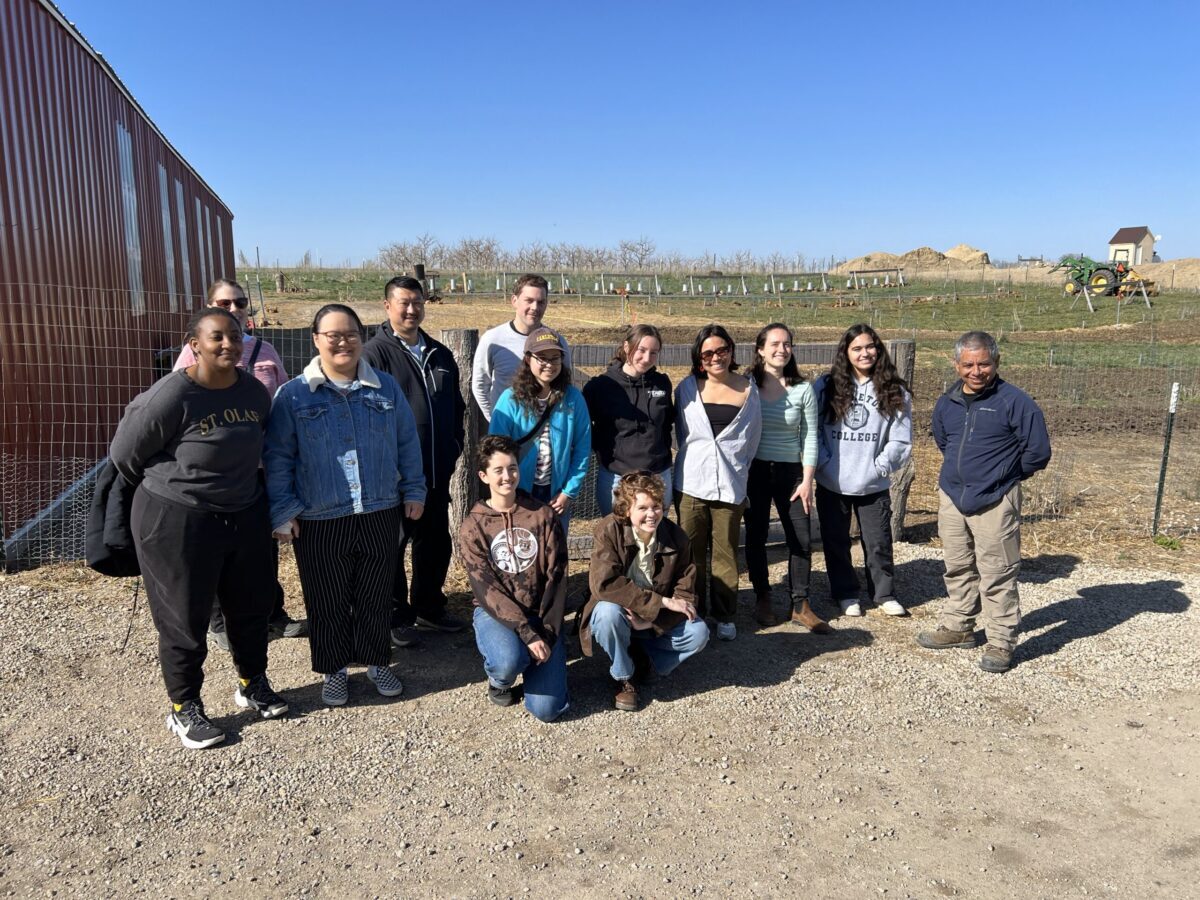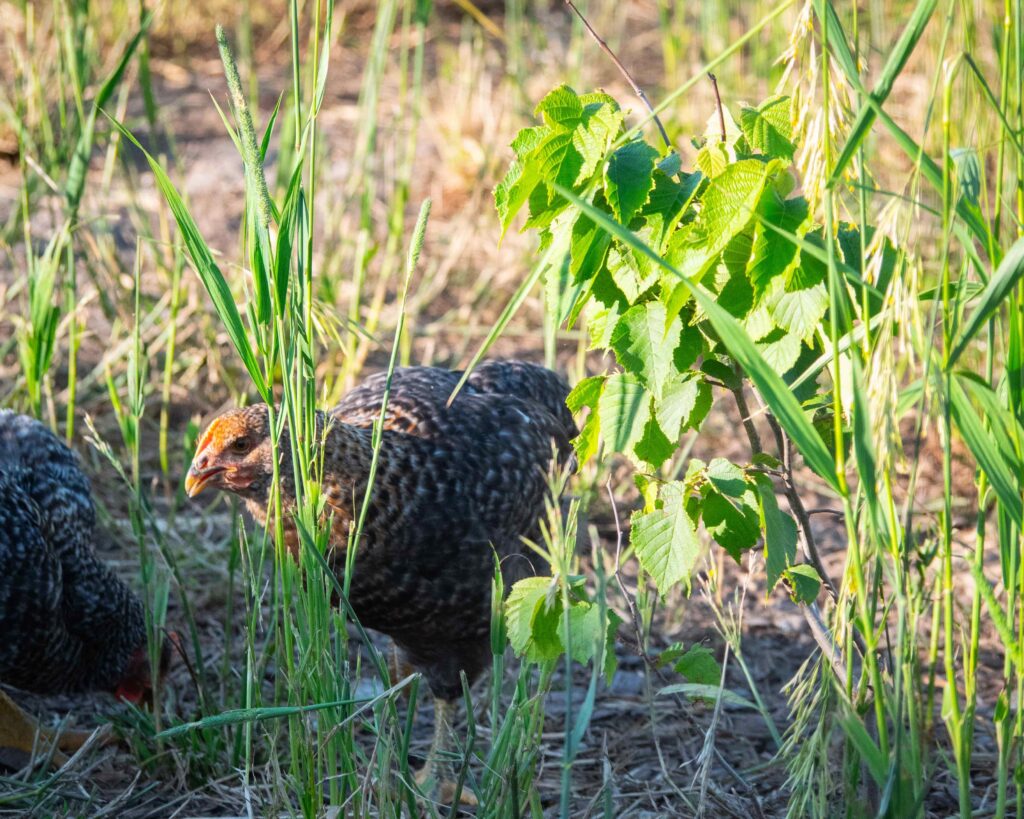Farm to Fork Profile: A Vision for the Future of Regenerative Agriculture at Tree-Range Farms
- by Elise Kulers

Former Fellow Elise Kulers (third from right) joined a group of Carleton and St. Olaf students and Bon Appetit team members on a field trip to Salvatierra Farms, where owner Reginaldo Haslett-Marroquin (far right, standing) explained his farming philosophy at his “poultry-centered regenerative system.”
Reginaldo Haslett-Marroquin is the architect of the poultry-centered regenerative agroforestry system. But until recently, he did not have a farm. When he and his family moved three years ago onto new land in Northfield, MN to set up their chicken farm, the first thing he built was not for the chickens but for his family: a quaint and cozy patio complete with chairs, lights, and a few grills. “Work will find us day and night, but isn’t the sole objective here,” he shares. “We want to have fun too!”
Today, Salvatierra Farms is alive with flocks of free-range chickens roaming under native trees, and other crops. A group of 15 students, staff, and Bon Appétit chefs from St. Olaf College and Carleton College, where Salvatierra is a Farm to Fork partner, recently had the privilege of learning from Regi’s unique approach to agriculture (and life itself!).
The Man Behind the Plan
Regi has long been a visionary in sustainable agriculture and a committed advocate of economic development projects around the world. After immigrating to the United States from Guatemala at the end of 1992, he founded Peace Coffee, a Minnesota-based Fair Trade coffee company (and Farm to Fork partner at Carleton and St. Olaf College). He’s continued his journey in agricultural transformation, now focused on regenerative chicken production inspired by ancestral Indigenous ways of thinking, relating, and working as part of nature.
Regi does not accept that he runs a farm, which purely considers inputs and outputs. Instead, he manages what he calls a “poultry-centered regenerative system,” which considers the entire ecosystem more holistically. This philosophy, which was designed to meet or exceed every environmental and animal welfare standard in the industry, led to the creation of a “business ecosystem” where Tree-Range® Chicken is the first product, soon to be followed by hazelnuts, garlic, elderberries, and other perennial and annual crops.
As Regi describes, raising chickens in forested rotating paddocks more closely mimics their preferred shady, jungle-like habitat — a stark contrast from a crowded conventional chicken house, or even an exposed “free-range” pasture. Native hickories and oaks mingle with hazelnut and elderberry trees to create a canopy that helps protect the animals and the soil below. The chickens also naturally weed and fertilize the land, which enriches the soil and supports the growth of native plants. The perennial roots help store carbon, reduce erosion, and enhance water retention. And the trees will provide future fruit and nut harvests as a supplemental income stream and nutritious food sources for the chickens. In addition, the canopy creates a perfect environment to incorporate sprouted grains, a super nutritious food supplement.
Careful consideration for the health of the chickens and their surrounding environment paints a compelling picture backed by significant well-being improvements. Regi proudly shared that the usual mortality rate for a conventional chicken farm is around 10-15%. At Salvatierra, it’s less than 5%. When chickens do occasionally get sick, they are given herbal remedies he learned from his mother back in Guatemala and have been further tested in Minnesota. These treatments have been shown to improve the chickens’ health and removes the need for administering antibiotics or other drugs.

A Bright Future for Tree-Range Chicken
Salvatierra Farms is just one of many farms carrying out the future of regenerative poultry in the Midwest. Also led by Regi and his team, Tree-Range® Farms is a collectively owned network of seven farms currently in production (and growing!) located within a three-hour drive of their shared processing facility in Northern Iowa. These farmers operate with the same all-encompassing agricultural philosophy and sell their product under the Tree-Range® label, opening the door for others to join the rising tide of regenerative chicken farming in Minnesota and beyond.
One of their goals is to reduce the barrier to entry for new farmers by managing the processing, distribution, and marketing sides of the business. To help support and expand the network of Tree-Range® Farms, Regi founded the Regenerative Agriculture Alliance, a nonprofit committed to scaling up climate-smart farming in the Midwest. RAA also developed an online training for interested potential farmers, allowing new members of the network to quickly learn and start earning capital despite a lack of previous livestock experience.
While the Tree-Range® approach lends itself to happier chickens, the motivation behind Regi’s work is more somber. Fueled by an urgency to address our broken food and climate systems, he feels there’s no time to waste in actualizing a reimagined food system that supports healthier and happier chickens, farmers, families, and the earth. Our Bon Appétit team at Carleton is proud to support the important work of Tree-Range® as Regi continues to expand his business, farm network, and nonprofit in the hopes of revitalizing agriculture as we know it, and to have fun while doing it.